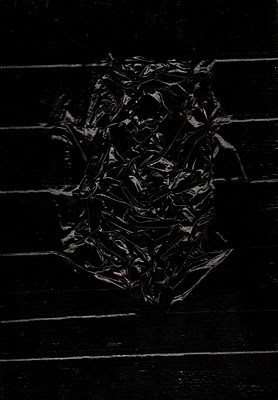On Ecology and Art
“Will you please write just one great book instead of a bunch of good ones, please?”

I read that on Twitter about an hour ago, from Giancarlo. I’ve been wanting to write down or through some thinking about an ecology of art for awhile. Ecology may be the right word, economy may be the right word. I’m wary of economy. I hate economics and finance, although I find myself morbidly curious about it all.
I’m increasingly convinced that living in megaindustrialized/meganetworked environments is not good, for the most part. Abuses of power are rampant and easy to hide behind layers and layers of abstracted steps up or down the supply chain. I’m thinking about: the bloody production of electronics, the bailout of gambling houses/i.e. banks and investment firms, the Gulf oil spill, the Iraq & Afghanistan wars. As much as I’d like to dodge particularizing the general and vice versa, these destructive events seem to stem from the mishandling of resources. Companies like Apple, Dell, Sony and Samsung don’t want to pay suppliers and manufacturers more to make sure their materials come from mines that aren’t run by violent criminals; they point their finger at the next abstract layer in the supply chain and say ‘We’re trying, but it’s really their responsibility.’ It’s easy to use your publicly trusted persona to direct attention/blame elsewhere. BP avoided building and maintaining a safe structure. They saved money in the short term, then the rig blew up. People died. We know the rest. I don’t claim to know much, but I bet that building hospitals and schools and roads in Iraq and Afghanistan would be more effective against future violence than what’s happening there now. It may not guarantee an easy extraction point for oil and lithium, though. READ MORE >
Differences, casually.
Maybe the primary makings of and differences between art and entertainment are this: art is more intensive, and entertainment more extensive. That the properties of art that seem powerful are harder to measure, harder to define or classify. That entertainment is more obviously calculated, patterned. And that, if you feel you have to, you can measure both properties and use whichever name you want.
Stasis, Movement, Perception, Forward

from the manifesto of transition, a literary journal, published in 1929: “Tired of the spectacle of short stories, novels, poems and plays still under the hegemony of the banal word, monotonous syntax, static psychology, descriptive naturalism, and desirous of crystallizing a viewpoint… Narrative is not mere anecdote, but the projection of a metamorphosis of reality.”
from Reddit: “In 1903 the Wright brothers flew for 59 seconds. 38 years later the Japanese bombed Pearl Harbor. 28 years after that, we landed on the moon. We went from gliding a few feet off the ground for less than a minute to launching rockets out of orbit, traveling for hundreds of thousands of miles, landing on the moon, and then returning, all within a single lifetime.”
–
If you define technological growth/advancement as the continual manifestation of processes previously unexperienced, how would you define cultural growth/advancement? Is there such a thing? I sometimes think that evolution is a weird and harmful idea; so easy to term something as growth that may be more destructive in implicit or temporally stretched ways. Most of this relates to what I get in arguments about most of the time, anyway, which is: should there ever be an accepted utopia-pointed all-human goal? And if not, doesn’t the notion of advancement, even on a small (cultural; decade-to-decade) scale crumble? And, even smaller still: isn’t the (for now mostly inexplicable) emotional foundation for human action the purest and most reasonable foundation there is?
addendum: Also: if we say that technological improvement is understood as making new processes or making old processes with less energy, maybe we try to make our culture more efficient.
Fire Beats Art
![]()
This morning, I heard a story on NPR about the wildfires in Russia.
Among the stories of the tragic loss of life and home was one about a woman in a small village who attempted to save her house from the flames by standing out front holding up a Russian Orthodox religious icon. One could react to this in a number of ways. This could be an opportunity to deride religious faith or a point in the “God is dead or never was” column. This could be seen as a cautionary tale about the right and wrong kind of fire extinguisher a person should have on hand in their home. Or this could be, for artists, a time to offer an apology.
To the extent that I might or might not be an “artist,” and bearing in mind the fact that, even if I could be considered an “artist,” the community of artists is likely never going to vote me in as their spokesman, I would still like to apologize to this Russian woman for the failure of the religious icon to stop the fire from consuming her house.
I realize that when holding up the icon against the fire, the woman was thinking of it as a lens through which to focus her religious faith, and hoped that through her faith her home would be spared. It was a religious icon being held up to beat back the fire, not, say, a de Kooning print or a copy of Joshua Cohen’s new novel Witz*. But religious proxy or not, it was still a piece of art, and it still failed to save her house.
Frankly, artists should be thanking this woman. She has a—probably misplaced—faith in art**. A faith most artists certainly don’t have***. She tried to hold back the destruction of her home with art and art failed her.
And when art fails, it is because the artist failed.
Go ahead and complain that the woman did not use art as directed. Try to find some clever loophole to absolve yourself of the guilt. Deep down, though, we know what we did. Or what we failed to do, anyway. Shame on us.
Russian lady: we’re sorry****.
* Have you readers heard anything about this book? Anywhere?
** And—possibly misplaced—faith in God. But who am I to judge?
*** Cynical, cynical bunch.
**** And those of us who aren’t should be.
The Books of Kier Cooke Sandvik

More incredible work at Kier’s blog.
I was the one who was called to make it: an interview with Luca Dipierro

Luca makes films, makes paintings, makes stories. He recently moved from New York to North Carolina, where he has become a visual artist full time. We talk about this recent decision, the relationship of art & commerce, art as work, and what is beautiful/not pure.
KB: So, what I’m immediately curious about is your thought process before you moved to North Carolina and decided to make art your primary business. Was there a definite moment in which you decided this?
May 26th, 2010 / 9:00 am
“…so thieves, sirs, you are imbeciles, now return them.”

This, from the AP, via NPR:
A lone thief stole five paintings possibly worth more than half a billion dollars, including major works by Picasso and Matisse, in a brazen overnight heist at a Paris modern art museum, police and prosecutors said Thursday.
[…]
The director of the neighboring modern art museum Palais de Tokyo, Pierre Cornette de Saint-Cyr, called the thief or thieves “fools.”
“You cannot do anything with these paintings. All countries in the world are aware, and no collector is stupid enough to buy a painting that, one, he can’t show to other collectors, and two, risks sending him to prison,” he said on LCI television.
“In general, you find these paintings,” he said. “These five paintings are unsellable, so thieves, sirs, you are imbeciles, now return them.”
The assumption here, of course, is that the thieves would want to sell the work. Maybe they just wanted the paintings for their living room? Maybe they just wanted to steal them, to see if they could? Such an act of daring, commodified. Shame.
What’s your fantasy heist?


